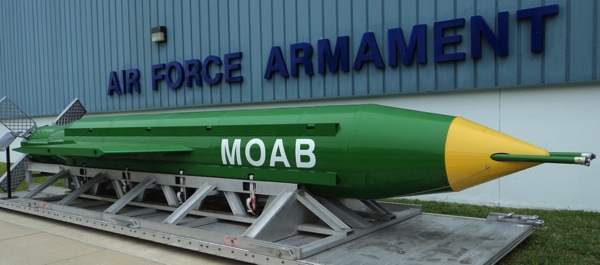Should We Have Dropped the Bomb on Afghanistan?

In the photo above courtesy of wearechange.org, the Mother of All Bombs (MOAB) was dropped on Afghanistan, potentially causing World War III. But was it really necessary?
May 10, 2017
On Thursday, April 13, 2017, The United States military dropped the largest non-nuclear bomb on the terrorist organization, ISIS, in Afghanistan. The 21,000 lbs bomb struck what United States intelligence revealed to be a network of tunnels where ISIS fighters were hiding out with the intention to continue degrading the fighting force of ISIS. America can rest easy, knowing the world is safer with nearly 100 ISIS fighters dead via the mother of all bombs, right? Wrong. While many see this bomb as a necessary course of action in defeating the infamous terrorist group, most fail to see the long-term effects and no one truly knows what necessary course of action will emerge with the releasing of this bomb into the world.
Directly a cause of the Afghanistan bombing, North Korea and the United States have found themselves in a state of Nuclear Brinkmanship, a term which has not been used since the Cold War. Nuclear brinkmanship is describing a state in which two countries push and maneuver around a politically unstable situation creating one in which two countries are on the brink of violent conflict and are slowly antagonizing the other without flat out declaring war. John Foster Dulles, United States president Dwight Eisenhower’s secretary of state famously conveys the danger of a state of brinkmanship by having stated “If you cannot master it, you inevitably get into a way. If you try to run from it, if you are scared to go to the brink, you are lost.” Because of the United States’ reckless decision of bombing not only Afghanistan but Syria as well, the country has found itself at the brink with North Korea.
On April 15, 2017, shortly following the bombing in Afghanistan and a direct result of the event, North Korea launched a test missile into the Pacific Ocean, and regardless of the weapon exploding nearly as soon as it was launched, this action was perceived as an act towards war because the missile was aimed for the Sea of Japan, a close economic partner and ally of the United States since World War II. In retaliation, President Donald Trump ordered the USS Carl Vinson, a nuclear reactor powered vessel carrying nearly 100 aircraft along with destroyers, a submarine, and a cruiser, to the Sea of Japan. Accompanying this vessel were two slightly smaller, but powerful ships: the USS Michael Murphy and the USS Lake Champlain. And as if that was not enough, the United States are in the process of sending the USS Ronald Reagan and the USS Nimitz, both 1000 feet long vessels weighing over 1000 tons and capable of carrying over 90 aircraft, to also remain in the Sea of Japan.
What is the necessity of sending war vessels and aircraft when we are not in conflict? The state of brinkmanship is worrisome and leaves the United States at the brink of war. The vice president, Mike Pence, states that “We seek peace always as a country, as does Japan, but as you know and the United States knows, peace comes through strength and we will stand strongly with Japan and strongly with our allies for a peace and security in this region.” Despite the view of the United States government, if one mistake, one slip up, one misfire occurs in the Sea of Japan, the entire world could find themselves in the midst of World War III.



